Orphanage of Mercy, Kilburn, London
In 1864, Emily Harriet Elizabeth Ayckbowm founded the Church Extension Association — a group which aimed to make the Anglican church more accessible, particularly to the poor and those of limited education. The Association especially campaigned against the then widespread practice of church pews being rented or 'owned' by particular families and reserved for their exclusive use, even if they rarely attended services.
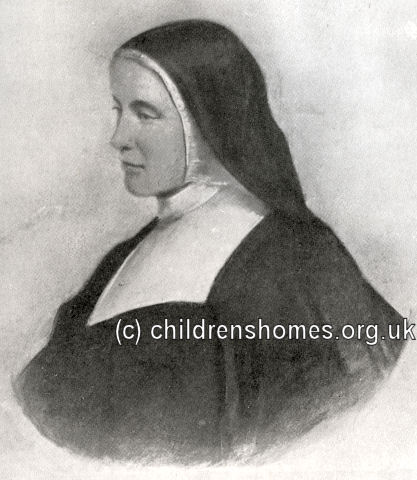
Sister Emily Ayckbowm, 1870s. © Peter Higginbotham
By 1870, Ayckbowm had became involved in social end educational work among the poor in Kilburn, where she now resided. In that year, she founded an Anglican order of nuns known as the Community of the Sisters of the Church, sometimes referred to as the Kilburn Order. From this time on, the Association and the Community were widely viewed as being the same body.
On Shrove Tuesday, 1875, the Sisters opened an orphanage for girls at 27-29 Kilburn Park Road, adjacent to their own quarters which were now at 57 Randolph Gardens. By Easter Sunday, there were already thirty children in residence who had come from all over England.
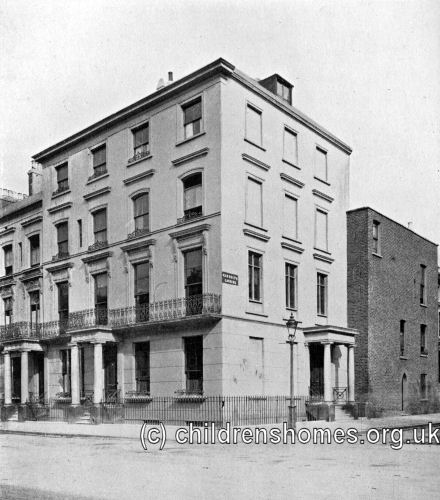
27-29 Kilburn Park Road and 57 Randolph Gardens. © Peter Higginbotham
Withe the Kilburn Park Road Houses soon becoming full, Sister Emily began raising funds for a much larger permanent building. A site was secured close by, running between Randolph Gardens and Rudolph Road, next to St Augustine's Church. Building work began in 1878 and the first section of the new Orphanage of Mercy, as it was named, was officially opened on June 3rd, 1880. Over the following years, two large dormitories and refectories were added, followed by a large hall below a large chapel, an finally a large five-story wing covering the remainder of the available site. By 1886, the Orphanage could house up to 300 girls in 1886, and 500 by 1892.
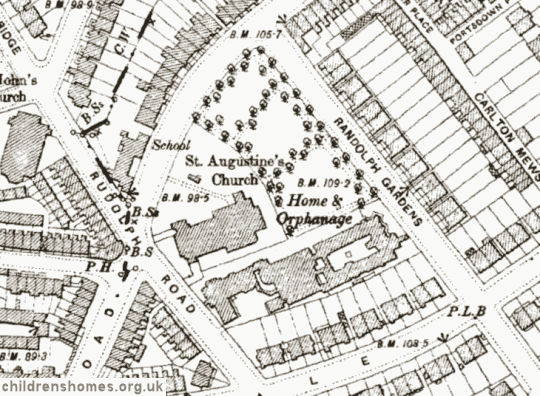
Orphanage of Mercy site, Kilburn, 1896.
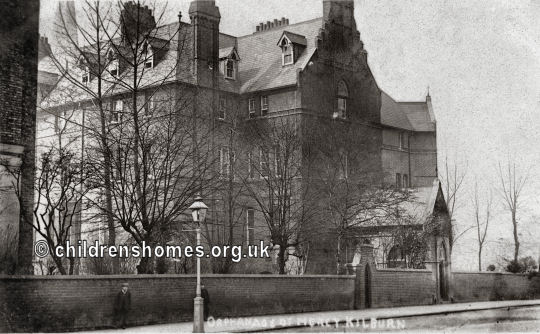
Orphanage of Mercy, Kilburn - east front. © Peter Higginbotham
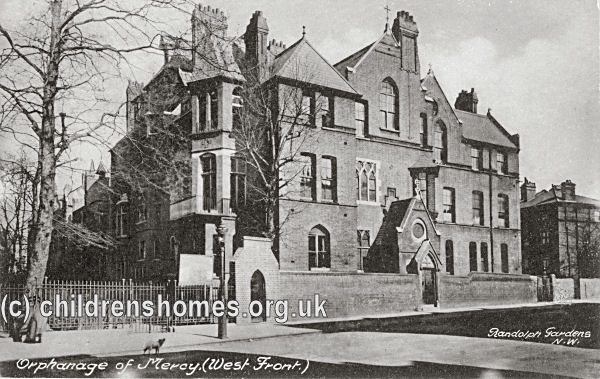
Orphanage of Mercy, Kilburn - from the west. © Peter Higginbotham
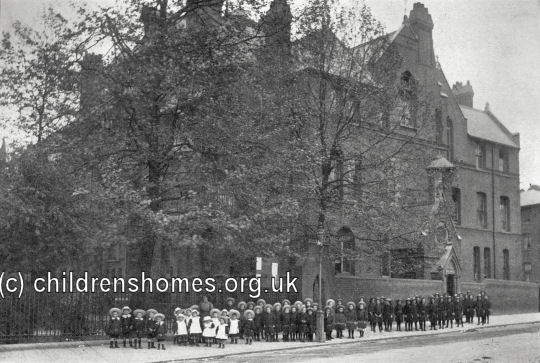
Orphanage of Mercy, Kilburn - west front. © Peter Higginbotham
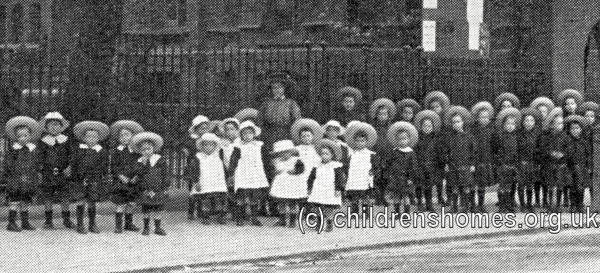
Orphanage of Mercy, Kilburn - west front. © Peter Higginbotham
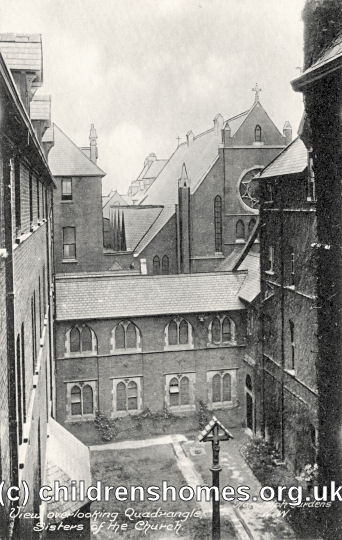
Orphanage of Mercy, Kilburn - view over quadrangle. © Peter Higginbotham
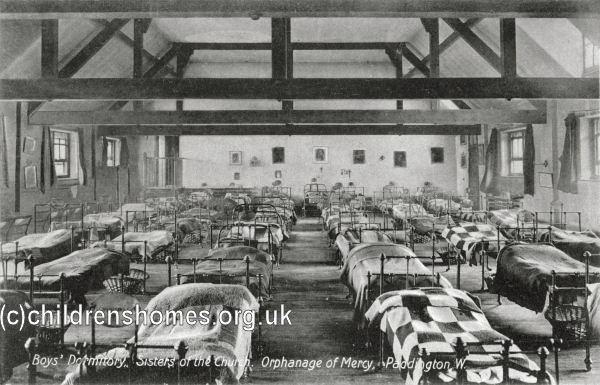
Orphanage of Mercy, Kilburn - boys' dormitory. © Peter Higginbotham
The Kilburn Orphanage received girls 'who are literally without a friend in the world'. In practice, this comprised girls who had lost both parents, had no other relatives capable of supporting them, and had no-one else willing to fund their maintenance at a paying orphanage. Wherever possible, the orphanage took members of the same family. It also appears that the Orphanage received small boys. The older girls were trained for employment as domestic servants or schoolmistresses.
Amongst the establishment's earliest inmates were a group of seven girls from the Morpeth Union workhouse in Northumberland, a matter which caused some controversy in the girls' home area.
In 1892, the Sisters became embroiled in controversy after it was alleged that they received illegitimate children into their care, giving the mother a payment if she surrendered all rights over the child to them. It was also claimed that children were sometimes kept in wire cages. Following these and other criticisms, the names of the Archbishops of Carnterbury and York were removed from the organisation's patrons list.
In 1941, after suffering war damage, the Randolph Gardens premises were taken over by the government. The buildings no longer survive and modern flats now occupy the site.
As well as the Orphanage of Mercy, the Church Extension Society operated a number of other homes.
Records
Note: many repositories impose a closure period of up to 100 years for records identifying individuals. Before travelling a long distance, always check that the records you want to consult will be available.
- Community of the Sisters of the Church holds records for homes run by the Order. Enquiries should be directed to: Community Archivist, St Michael's Convent, Vicarage Way, Gerrards Cross, Bucks SL9 8 AT. Email archives@sistersofthechurch.org. (Note: no records are held for individual convalescent children for either St Mary's Convalescent Home, Thanet, Kent, or the Abraham Ormerod Convalescent Home, Lytham St Anne's.)
Census
Bibliography
- Anonymous, A Valiant Victorian: The Life and Times of Mother Emily Ayckbowm 1830-1900 of the Community of the Sisters of the Church (1964, A. R. Mowbray & Co. Ltd., London)
- Whittington, Vera Sister Kate: A Life Dedicated to Children in Need of Care (1999, University of Western Australia Press)
Links
Except where indicated, this page () © Peter Higginbotham. Contents may not be reproduced without permission.


